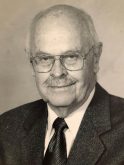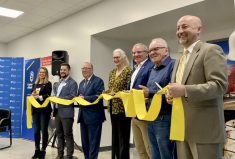The environmental scientist of the future may be someone who sits at a computer in an office building all day and never ventures outdoors.
Gordon Goldsborough raised that scenario with the Manitoba Conservation Districts Association to warn about the state of environmental education in Canada.
Students in environmental programs are being shortchanged because universities are eliminating field work from courses, Goldsborough, a University of Manitoba aquatic ecologist, told the MCDA’s recent annual convention.
Field-based courses give students their only meaningful outdoor experience during their academic programs. Without it, graduates go out into the world with a head full of environmental science but no practical experience, said Goldsborough, a water quality specialist.
Read Also

Mazergroup’s Bob Mazer dies
Mazergroup’s Bob Mazer, who helped grow his family’s company into a string of farm equipment dealerships and the main dealer for New Holland machinery in Saskatchewan and Manitoba, died July 6 from cancer.
LIKE A PILOT THAT’S NEVER FLOWN
It would be like a pilot who has trained on a computer flight simulator but never flown a real plane, he told MCDA delegates.
But that is what’s happening now at many universities and it poses a serious threat to the future of environmental training, he said.
“You can’t really fully understand things if you just hear about it in lectures and maybe see pictures. You need to experience it,” Goldsborough said after speaking to the MCDA.
“You have to have had a meaningful experience in the country to understand the country. You can’t just read a book and get it.”
But funding cutbacks and a general disinterest in outdoor education could produce a generation of environmentalists lacking actual work experience with the environment, warned Goldsborough.
Goldsborough fights that battle constantly at the University of Manitoba, where he teaches two of the few courses to incorporate field experience in the syllabus.
VOLUNTARY EXPERIENCE
One course offers two voluntary weekends in fall when students can paddle canoes through Delta Marsh north of Portage la Prairie and observe aquatic botany first hand. Only about half of them participate.
The other course is an intensive all-day, two-week program
in wetland ecology conducted entirely in the field. It’s always touch and go as to whether enough students will enrol in order to offer the course.
The reason is twofold. Universities do not encourage field work and students lack interest in it, according to Goldsborough.
It isn’t just the students. Goldsborough said it’s like pulling teeth to get his own colleagues to support field experience.
He’s tried for years to arrange a faculty retreat at Delta Marsh, where the university’s field station has overnight facilities for 65 people. The staff always refuse because they might have to drive on gravel roads and get their shoes dirty.
It’s serious for outdoor education if teachers themselves don’t like the outdoors, said Goldsborough.
“They don’t see the value of outdoor experience, so they won’t pass that impression on to their students. So as we progress, those students, some of whom are going to become the next generation of instructors at the university, will see less and less interest in going out of doors.
“Everything will be done virtually. You’ll do a simulation of a field trip rather than the real thing. That really worries me.”
STAFF
Conservation districts should also worry because their staff are often University of Manitoba graduates, Goldsborough said.
The conference heard it takes a full year for a C.D. general manager to become fully functional
on the job. Many of them move on after only two years.
“The minute you’ve got them trained, they’re gone,” said Goldsborough.
“We need to be really worried about the future of landscape management because the people who’ll be doing it just won’t be qualified and they won’t hang around long enough to have any institutional memory.”
He urged C.D. s to lobby universities to include more field experience in their courses.
You don’t have to be a country person to develop an interest in the outdoors, Goldsborough added. He himself grew up in Charleswood but spent his summers as a kid on his relatives’ farms, doing farm work and learning to live with the land. It was great background for a future career in environmental science. [email protected]
———
“Youcan’tjustreadabookandgetit.”
– GORDON GOLDSBOROUGH, U OF M


















